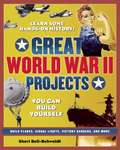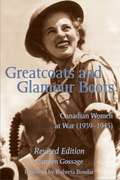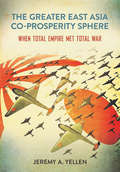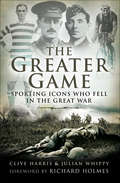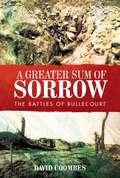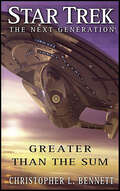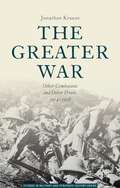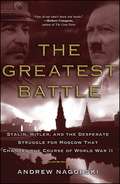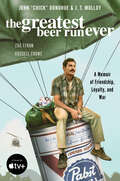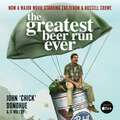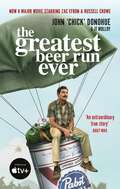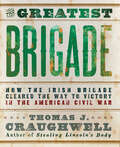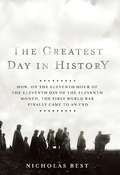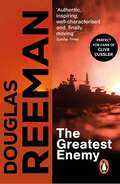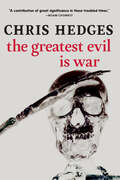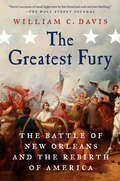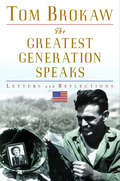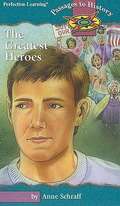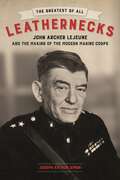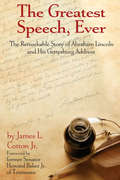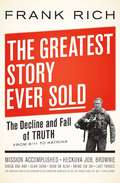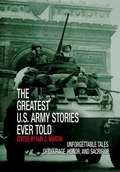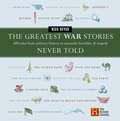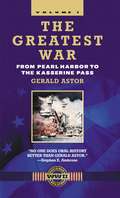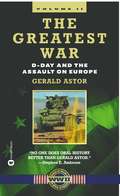- Table View
- List View
GREAT WORLD WAR II PROJECTS
by Sheri Bell-RehwoldtFrom spy maps and victory banners to spotter planes and ration cakes, Great World War II Projects You Can Build Yourself brings one of the most defining periods of American and world history to life through hands-on building projects and activities. Detailed step-by-step instructions for creating each project combine with historical facts and anecdotes, biographies, and trivia about the real-life models. Together they give kids a first-hand look at daily life at home and on the front lines during America's war years.
Greatcoats and Glamour Boots: Canadian Women at War, 1939-1945, Revised Edition
by Carolyn Gossage Roberta BondarWomen in the military? To many, never was too soon. But by 1940, British women were out "doing their bit" for the war effort, and Canadians battled for that same right. Young Canadian women wanted to serve their country, "to free a man to fight," as the recruiting posters urged. By the war’s end almost 50,000 of them were in the forces.Carolyn Gossage has compiled a fascinating collage of anecdotal and documentary material. The colourful story of Canada’s "forgotten women" - those who volunteered for service during World War II in the RCAF Women’s division, the Canadian Women’s Army Corps (CWAC) and the Women’s Royal Canadian Naval Service (Wrens) - entertains and enlightens.
The Greater East Asia Co-Prosperity Sphere: When Total Empire Met Total War (Studies of the Weatherhead East Asian Institute, Columbia University)
by Jeremy A. YellenIn The Greater East Asia Co-Prosperity Sphere, Jeremy Yellen exposes the history, politics, and intrigue that characterized the era when Japan's "total empire" met the total war of World War II. He illuminates the ways in which the imperial center and its individual colonies understood the concept of the Sphere, offering two sometimes competing, sometimes complementary, and always intertwined visions—one from Japan, the other from Burma and the Philippines.Yellen argues that, from 1940 to 1945, the Greater East Asia Co-Prosperity Sphere epitomized two concurrent wars for Asia's future: the first was for a new type of empire in Asia, and the second was a political war, waged by nationalist elites in the colonial capitals of Rangoon and Manila. Exploring Japanese visions for international order in the face of an ever-changing geopolitical situation, The Greater East Asia Co-Prosperity Sphere explores wartime Japan's desire to shape and control its imperial future while its colonies attempted to do the same. At Japan's zenith as an imperial power, the Sphere represented a plan for regional domination; by the end of the war, it had been recast as the epitome of cooperative internationalism. In the end, the Sphere could not survive wartime defeat, and Yellen's lucidly written account reveals much about the desires of Japan as an imperial and colonial power, as well as the ways in which the subdued colonies in Burma and the Philippines jockeyed for agency and a say in the future of the region.
The Greater Game: Sporting Icons Who Fell in the Great War
by Clive Harris Julian WhippyFrom the athletic fields to the fields of battle—these great sportsmen gave their all and sacrificed their lives for their countries in World War I. As the First World War swept across Europe, millions of eager and idealistic volunteers lined up to serve in what was to be the War to End All Wars. All were expected to do their duty—and those rare men who were idolized as the greatest athletes of their time were bound and determined to keep up their end. But no one could have foreseen the true horrors of war that awaited them all . . . This fascinating book examines the deadly impact of the Great War on a number of leading professional sportsmen of the age. Their untimely deaths underscored how even the fittest and most gifted were as vulnerable as any normal soldier—and their loss was felt by far more than their families and friends. Among those featured in this illustrated book are such luminaries as Donald Bell, the only professional football player to win the Victoria Cross; Anthony Wilder, the glamorous Wimbledon champion who fell in May 1915; Francois Faber, the Tour de France star; Percy Poulton Palmer, the England Rugby Captain; and many others. Here, the authors explore the effect that famous athletes have on their countrymen and fellow soldiers in a time of war, and the devastating consequences that World War I had on the emerging world of professional sports.
A Greater Sum of Sorrow: The Battles of Bullecourt
by David CoombesIn April-May 1917 the sleepy hamlet of Bullecourt in northern France became the focus of two battles involving Australian and British troops. Given the unique place in this nation’s military history that both battles occupy, surprisingly little has been written on the AIF’s achievements at Bullecourt. A Greater Sum of Sorrow seeks to remedy this gaping omission. The First Battle of Bullecourt marked the Australians’ introduction to the latest battlefield weapon — the tank. This much-lauded weapon failed dismally amid enormous casualties. Despite this, two infantry brigades from the 4th Australian Division captured parts of the formidable Hindenburg Line with minimal artillery and tank support, repulsing German counter-attacks until forced to withdraw. In the second battle, launched with a preliminary artillery barrage, more Australian divisions were forced into the Bullecourt ‘meat-grinder’ and casualties soared to over 7000. Again Australian soldiers fought hard to capture parts of the enemy line and hold them against savage counter-attacks. Bullecourt became a charnel-house for the AIF. Many who had endured the nightmare of Pozières considered Bullecourt far worse. And for what? While Field Marshal Sir Douglas Haig considered its capture ‘among the great achievements of the war’, the village that cost so many lives held no strategic value whatsoever.
Greater Than the Sum (Star Trek: The Next Generation)
by Christopher L. BennettThe Starship Rhea has discovered a cluster of carbon planets that seems to be the source of the quantum energies rippling through a section of space. A landing party finds unusual life-forms inhabiting one of the planets. One officer, Lieutenant T'Ryssa Chen -- a half-Vulcan -- makes a tenuous connection with them. But before any progress can be made, the Rhea comes under attack from the Einstein -- a Starfleet vessel now controlled by the Borg. The landing party can only listen in horror as their comrades are assimilated. The Borg descend to the planet, and just as Chen accepts that she will be assimilated, the lieutenant is whisked two thousand light-years away. A quantum slipstream -- instantaneous transportation -- is controlled by these beings in the cluster, and in the heart of the cluster there is now a Borg ship. Cut off from the rest of the Borg collective, the Einstein cannot be allowed to rejoin it. For the sake of humanity, the Borg cannot gain access to quantum slipstream technology. Starfleet Command gives Captain Picard carte blanche: do whatever he must to help the beings in the cluster, and stop the Einstein no matter the cost.
The Greater War
by Jonathan KrauseThe Greater War is an international history of the First World War. Comprising of thirteen chapters this collection of essays covers new aspects of the French, German, Italian and American efforts in the First World War, as well as aspects of Britain's colonial campaigns.
The Greatest Battle
by Andrew NagorskiThe battle for Moscow was the biggest battle of World War II -- the biggest battle of all time. And yet it is far less known than Stalingrad, which involved about half the number of troops. From the time Hitler launched his assault on Moscow on September 30, 1941, to April 20, 1942, seven million troops were engaged in this titanic struggle. The combined losses of both sides -- those killed, taken prisoner or severely wounded -- were 2.5 million, of which nearly 2 million were on the Soviet side. But the Soviet capital narrowly survived, and for the first time the German Blitzkrieg ended in failure. This shattered Hitler's dream of a swift victory over the Soviet Union and radically changed the course of the war. The full story of this epic battle has never been told because it undermines the sanitized Soviet accounts of the war, which portray Stalin as a military genius and his people as heroically united against the German invader. Stalin's blunders, incompetence and brutality made it possible for German troops to approach the outskirts of Moscow. This triggered panic in the city -- with looting, strikes and outbreaks of previously unimaginable violence. About half the city's population fled. But Hitler's blunders would soon loom even larger: sending his troops to attack the Soviet Union without winter uniforms, insisting on an immediate German reign of terror and refusing to heed his generals' pleas that he allow them to attack Moscow as quickly as possible. In the end, Hitler's mistakes trumped Stalin's mistakes. Drawing on recently declassified documents from Soviet archives, including files of the dreaded NKVD; on accounts of survivors and of children of top Soviet military and government officials; and on reports of Western diplomats and correspondents, The Greatest Battle finally illuminates the full story of a clash between two systems based on sheer terror and relentless slaughter. Even as Moscow's fate hung in the balance, the United States and Britain were discovering how wily a partner Stalin would turn out to be in the fight against Hitler -- and how eager he was to push his demands for a postwar empire in Eastern Europe. In addition to chronicling the bloodshed, Andrew Nagorski takes the reader behind the scenes of the early negotiations between Hitler and Stalin, and then between Stalin, Roosevelt and Churchill. This is a remarkable addition to the history of World War II.
The Greatest Beer Run Ever: A Memoir of Friendship, Loyalty, and War
by John "Chick" Donohue J. T. Molloy“Chickie takes us thousands of miles on a hilarious quest laced with sorrow, but never dull. You will laugh and cry, but you will not be sorry that you read this rollicking story.”—Malachy McCourtSoon to be a major motion picture written and directed by Peter Farrelly, who won two Academy Awards for Green Book—a wildly entertaining, feel-good memoir of an Irish-American New Yorker and former U.S. marine who embarked on a courageous, hare-brained scheme to deliver beer to his pals serving Vietnam in the late 1960s.One night in 1967, twenty-six-year-old John Donohue—known as Chick—was out with friends, drinking in a New York City bar. The friends gathered there had lost loved ones in Vietnam. Now, they watched as anti-war protesters turned on the troops themselves. One neighborhood patriot came up with an inspired—some would call it insane—idea. Someone should sneak into Vietnam, track down their buddies there, give them messages of support from back home, and share a few laughs over a can of beer. It would be the Greatest Beer Run Ever. But who’d be crazy enough to do it? One man was up for the challenge—a U. S. Marine Corps veteran turned merchant mariner who wasn’t about to desert his buddies on the front lines when they needed him. Chick volunteered. A day later, he was on a cargo ship headed to Vietnam, armed with Irish luck and a backpack full of alcohol. Landing in Qui Nho’n, Chick set off on an adventure that would change his life forever—an odyssey that took him through a series of hilarious escapades and harrowing close calls, including the Tet Offensive. But none of that mattered if he could bring some cheer to his pals and show them how much the folks back home appreciated them.This is the story of that epic beer run, told in Chick’s own words and those of the men he visited in Vietnam.
The Greatest Beer Run Ever: A Crazy Adventure in a Crazy War *NOW A MAJOR MOVIE*
by J. T. Molloy John 'Chick' Donohue***NOW A MAJOR MOVIE STARRING ZAC EFRON, RUSSELL CROWE AND BILL MURRAY THE NEW YORK TIMES BESTSELLER 'An extraordinary story.' - Daily Mail'An unforgettable, wild ride from start to finish.' - John Bruning'The astounding true story - from the streets of Manhattan to the jungles of Vietnam.' - Thomas KellyIT SEEMED LIKE A GOOD IDEA AT THE TIME.As a result of a rowdy night in his local New York bar, ex-Marine and merchant seaman "Chick" Donohue volunteers for a legendary mission. He will sneak into Vietnam to track down his buddies in combat to bring them a cold beer and supportive messages from home. It'll be the greatest beer run ever!Now, decades on from 1968, this is the remarkable true story of how he actually did it.Armed with Irish luck and a backpack full of alcohol, Chick works his passage to Vietnam, lands in Qui Nhon and begins to carry out his quest, tracking down the disbelieving soldiers one by one.But things quickly go awry, and as he talks his way through checkpoints and unwittingly into dangerous situations, Chick sees a lot more of the war than he ever planned - spending a terrifying time in the Demilitarized Zone, and getting caught up in Saigon during the Tet Offensive.With indomitable spirit, Chick survives on his wits, but what he finds in Vietnam comes as a shock. By the end of his epic adventure, battered and exhausted, Chick finds himself questioning why his friends were ever led into the war in the first place.
The Greatest Beer Run Ever: A Crazy Adventure in a Crazy War *NOW A MAJOR MOVIE*
by J. T. Molloy John 'Chick' Donohue***NOW A MAJOR MOVIE STARRING ZAC EFRON, RUSSELL CROWE AND BILL MURRAY THE NEW YORK TIMES BESTSELLER 'An extraordinary story.' - Daily Mail'An unforgettable, wild ride from start to finish.' - John Bruning'The astounding true story - from the streets of Manhattan to the jungles of Vietnam.' - Thomas KellyIT SEEMED LIKE A GOOD IDEA AT THE TIME.As a result of a rowdy night in his local New York bar, ex-Marine and merchant seaman "Chick" Donohue volunteers for a legendary mission. He will sneak into Vietnam to track down his buddies in combat to bring them a cold beer and supportive messages from home. It'll be the greatest beer run ever!Now, decades on from 1968, this is the remarkable true story of how he actually did it.Armed with Irish luck and a backpack full of alcohol, Chick works his passage to Vietnam, lands in Qui Nhon and begins to carry out his quest, tracking down the disbelieving soldiers one by one.But things quickly go awry, and as he talks his way through checkpoints and unwittingly into dangerous situations, Chick sees a lot more of the war than he ever planned - spending a terrifying time in the Demilitarized Zone, and getting caught up in Saigon during the Tet Offensive.With indomitable spirit, Chick survives on his wits, but what he finds in Vietnam comes as a shock. By the end of his epic adventure, battered and exhausted, Chick finds himself questioning why his friends were ever led into the war in the first place.
The Greatest Brigade: How the Irish Brigade Cleared the Way to Victory in the American Civil War
by Thomas J. CraughwellA history of the impressive, predominantly Irish American brigade of the Union Army and their role in its victory over the Confederacy.Faugh a Ballagh! Clear the Way!This is the story of a band of heroes that covered the Yankee retreat at Bull Run, drove the Confederates from the Sunken Road at Antietam, and made charge after charge up Marye’s Heights at Fredericksburg. The gallantry of the Irish Brigade won them the admiration of the high command of both North and South, earned them seven Medals of Honor, and after the war, went a long way to helping the Irish assimilate into the American mainstream.Shouting their Gaelic battle cry, the men of the Irish Brigade charged across the bloodiest battlefields of the Civil War and into the realm of legend. The Greatest Brigade is a grand narrative history of these Irishmen who fought in every major battle in the Eastern Theater of the Civil War, including Bull Run, Antietam, Fredericksburg, Gettysburg, the Wilderness, and Appomattox.Praise for The Greatest Brigade“An exciting journey through the major battles of the Civil War alongside the members of the famed Irish Brigade. Well researched, compellingly written, filled with fascinating illustrations, and with a story that holds the reader with a “bulldog grip,” Thomas Craughwell has written a regimental history that deserves to be on every Civil War lover’s bookshelf.” —Jason Emerson, author of The Madness of Mary Lincoln and Lincoln the Inventor“This engrossing book will appeal both to Civil War buffs and to those interested in the Irish American experience.” —Library Journal“A paean to the Irish immigrants who fought for their adopted homeland. . . . This spirited hagiography marches through the battles fought by the Army of the Potomac’s justly renowned Irish Brigade at quickstep pace. Each chapter reads like an episode of a History Channel documentary.” —Historynet
The Greatest Day in History: How, on the Eleventh Hour of the Eleventh Day of the Eleventh Month, the First World War Finally Cam
by Nicholas BestUnlike 1945, the First World War did not end neatly with the unconditional surrender of the Germans. After a dramatic week of negotiations, military offensives and the beginning of a Communist revolution, the German Imperial regime collapsed. The Allies eventually granted an armistice to a new German government, and at eleventh hour on the 11th of November, the guns officially ceased fire, but only after 11,000 casualties had been sustained?almost as many as on D-Day. Nicholas Best tells the story in sweeping, cinematic style, revealing that events were far from pre-ordained. From the generalsOCO headquarters to the frontline trenches, from the factories to the farms, he reveals the twists and turns that led to the end of the Great War.
The Greatest Enemy: an all-guns-blazing tale of naval warfare from Douglas Reeman, the all-time bestselling master storyteller of the sea
by Douglas ReemanThis compelling nautical adventure from multi-million copy bestselling author Douglas Reeman will have readers of Clive Cussler, Bernard Cornwell and Wilbur Smith gripped with its expertly combined characterisation and vivid battle scenes. You'll feel like you are on the bridge yourself...!'One of our foremost writers of naval fiction' -- Sunday Times'I could not put it down. I enjoyed every single page of this seafaring tale.' -- ***** Reader review'Enthralling - just had to keep reading to the end' -- ***** Reader review'A cracking read' -- ***** Reader review'Exceptional' -- ***** Reader review'Nail biting to the end' -- ***** Reader review****************************************************************************Twenty-five years ago, HMS Terrapin was part of a crack hunter-killer group in the Battle of the Atlantic. Now she is working out her last commission in the Gulf of Thailand.To Lieutenant-Commander Standish, the frigate seems to mark the end of his hopes of a career in the Navy. Then a new captain arrives, a man driven by an old-fashioned, almost obsessive patriotism. And under his stubborn leadership, Standish and the crew discover a long-forgotten unity of purpose...She was one of the deadliest ships of the war. Her greatest heroics may still lie ahead.
The Greatest Evil is War
by Chris HedgesAn unflinching indictment of the horror and obscenity of war by one of our finest war correspondents.Drawn from experience and interviews by Pulitzer-prize-winner Chris Hedges, this book looks at the hidden costs of war, what it does to individuals, families, communities and nations.In fifteen short chapters, Chris Hedges astonishes us with his clear and cogent argument against war, not on philosophical grounds or through moral arguments, but in an irrefutable stream of personal encounters with the victims of war, from veterans and parents to gravely wounded American serviceman who served in the Iraq War, to survivors of the Holocaust, to soldiers in the Falklands War, among others. Hedges reported from Sarajevo, and was in the Balkans to witness the collapse of the Soviet Union. In 2002 he published War Is a Force that Gives Us Meaning, which the Los Angeles Times described as &“the best kind of war journalism… bitterly poetic and ruthlessly philosophical&” and the New York Times called &“a brilliant, thoughtful, timely, and unsettling book.&” In the twenty years since, Hedges has not wanted to write another book on the subject of war—until now, with the outbreak of war in Ukraine. It is important again to be reminded who are the victors of the spoils of war and of other unerring truths, not only in this war but in all modern wars, where civilians are always the main victims, and the tools and methods of war are capable of so much destruction it boggles the mind. This book is an unflinching indictment of the horror and obscenity of war by one of our finest war correspondents.
The Greatest Fury: The Battle of New Orleans and the Rebirth of America
by William C DavisFrom master historian William C. Davis, the definitive story of the Battle of New Orleans, the fight that decided the ultimate fate not only of the War of 1812 but the future course of the fledgling American republic. It was a battle most thought could not be won. Outnumbered farmers, merchants, backwoodsmen, smugglers, slaves, and Choctaw Indians, many of them unarmed, were up against the cream of the British army, professional soldiers who had defeated the great Napoleon and set Washington, D.C., ablaze. At stake was nothing less than the future of the vast American heartland, from the Gulf Coast to the Great Lakes, as the ragtag American forces fought to hold New Orleans, the gateway of the Mississippi River and an inland empire. Tipping the balance of power in the New World, this single battle irrevocably shifted the young republic's political and cultural center of gravity and kept the British from ever regaining dominance in North America. In this gripping, comprehensive study of the Battle of New Orleans, William C. Davis examines the key players and strategy of King George's Red Coats and Andrew Jackson's makeshift "army." A master historian, he expertly weaves together narratives of personal motivation and geopolitical implications that make this battle one of the most impactful ever fought on American soil.
The Greatest Generation Speaks: Letters and Reflections
by Tom Brokaw"I first began to appreciate fully all we owed the World War II generation while I was covering the fortieth and fiftieth anniversaries of D-Day for NBC News. When I wrote in The Greatest Generation about the men and women who came out of the Depression, who won great victories and made lasting sacrifices in World War II and then returned home to begin building the world we have today--the people I called the Greatest Generation--it was my way of saying thank you. I felt that this tribute was long overdue, but I was not prepared for the avalanche of letters and responses touched off by that book. Members of that generation were, characteristically, grateful for the attention and modest about their own lives as they shared more remarkable stories about their experiences in the Depression and during the war years. Their children and grandchildren were eager to share the lessons and insights they gained from the stories they heard about the lives of a generation now passing on too swiftly. They wanted to say thank you in their own way. I had wanted to write a book about America, and now America was writing back. The letters, many of them written in firm Palmer penmanship on flowered stationery, have given me a much richer understanding not only of those difficult years but also of my own life. They give us new, intensely personal perspectives of a momentous time in our history. They are the voices of a generation that has given so much and wants to share even more. Some of the letters were written from the front during the war, or from families to their loved ones in harm's way in distant places. There were firsthand accounts of battles and poignant reflections on loneliness, exuberant expressions of love and somber accounts of loss. It seems that everyone in that generation has something worthwhile to contribute, and so we have included some pages in The Greatest Generation Speaks for others to share memories at once inspirational and instructive. If we are to heed the past to prepare for the future, we should listen to these quiet voices of a generation that speaks to us of duty and honor, sacrifice and accomplishment. I hope more of their stories will be preserved and cherished as reminders of all that we owe them and all that we can learn from them. --Tom Brokaw.
The Greatest Heroes
by Anne SchraffWhen Ken's efforts to help end the Vietnam War fail, he is forced to decide where his loyalties lie.
The Greatest of All Leathernecks: John Archer Lejeune and the Making of the Modern Marine Corps
by Joseph Arthur SimonJoseph Arthur Simon’s The Greatest of All Leathernecks is the first comprehensive biography of John Archer Lejeune (1867–1942), a Louisiana native and the most innovative and influential leader of the United States Marine Corps in the twentieth century. As commandant of the Marine Corps from 1920 to 1929, Lejeune reorganized, revitalized, and modernized the force by developing its new and permanent mission of amphibious assault. Before that transformation, the corps was a constabulary infantry force used mainly to protect American business interests in the Caribbean, a mission that did not place it as a significant contributor to the United States defense establishment. The son of a plantation owner from Pointe Coupee Parish, Lejeune enrolled at Louisiana State University in 1881, aged fourteen. Three years later, he entered the U.S. Naval Academy, afterward serving for two years at sea as a midshipman. In 1890, he transferred to the Marines, where he ascended quickly in rank. During the Spanish-American War, Lejeune commanded and landed Marines at San Juan, Puerto Rico, to rescue American sympathizers who had been attacked by Spanish troops. A few years later, he arrived with a battalion of Marines at the Isthmus of Panama—part of Colombia at the time—securing it for Panama and making possible the construction of the Panama Canal by the United States. He went on to lead Marine expeditions to Cuba and Veracruz, Mexico. During World War I, Lejeune was promoted to major general and given command of an entire U.S. Army division. After the war, Lejeune became commandant of the Marine Corps, a role he used to develop its new mission of amphibious assault, transforming the corps from an ancillary component of the U.S. military into a vibrant and essential branch. He also created the Marine Corps Reserve, oversaw the corps’s initial use of aviation, and founded the Marine Corps Schools, the intellectual planning center of the corps that currently exists as the Marine Corps University. As Simon masterfully illustrates, the mission and value of the corps today spring largely from the efforts and vision of Lejeune.
The Greatest Speech, Ever: The Remarkable Story of Abraham Lincoln and His Gettysburg Address
by James H. Cotton Jr.This book was written to be more than a specialized monograph about the Gettysburg Address. The author digressed along the way into side excursions and back roads of Abraham Lincoln's remarkable life - exploring his hardscrabble childhood, and his courageous but controversial Emancipation Proclamation. After all, to fully understand how the Gettysburg Address came to be, one must understand how Abraham Lincoln came to be. Part of the greatness of the Gettysburg Address is that the DNA of Lincoln's life is found in every word. Senator Baker in his Foreword wrote "Judge Cotton's book is not only a fascinating and scholarly assessment of the Gettysburg Address and its impact on America, but also an absorbing look into Abraham Lincoln's life."
The Greatest Story Ever Sold: The Decline and Fall of Truth From 9/11 to Katrina
by Frank RichA step-by-step account of how skillfully the White House has built its house of cards, to consolidate its power at any cost.
The Greatest U.S. Army Stories Ever Told: Unforgettable Stories Of Courage, Honor, And Sacrifice
by Iain C. MartinEach story recounts the sights, sounds, and significance of such hallowed battlefields as Yorktown, Shiloh, and the Argonne. Watch row after row of redcoats attack during the Battle of Monmouth with eyewitness Joseph Plumb Martin. Ride a rickety boat with Washington in his famous night crossing over the Potomac.
The Greatest War Stories Never Told
by Rick BeyerSearch the annals of military history and you will discover no end of quirky characters and surprising true stories: The topless dancer who saved the Byzantine Empire. The World War I battle that was halted so a soccer game could be played. The scientist who invented a pigeon-guided missile in 1943. And don't forget the elderly pig whose death triggered an international crisis between the United States and Great Britain. This is the kind of history you'll find in The Greatest War Stories Never Told. One hundred fascinating stories drawn from two thousand years of military history, accompanied by a wealth of photographs, maps, drawings, and documents that help bring each story to life. Little-known tales told with a one-two punch of history and humor that will make you shake your head in disbelief -- but they're all true! Did You Know That: One military unit served on both sides during the Civil War. The War of Jenkins's Ear was actually fought over a sea captain's ear. Daniel Boone was once tried for treason. A siege on Poland in 1519 gave birth to the marriage of bread and butter Discover how war can be a catalyst for change; an engine for innovation; and an arena for valor, deceit, intrigue, ambition, revenge, audacity, folly, and even silliness. Want to know how the mafia helped the United States win World War II, when the word bazooka was coined, or how Silly Putty was invented? Read on!
The Greatest War - Volume I: From Pearl Harbor to the Kasserine Pass
by Gerald AstorWritten by award-winning journalist, acclaimed historian, and World War II veteran Gerald Astor, THE GREATEST WAR is an American combat history of World War II told largely in the words of the soldiers, sailors, airmen, and marines who fought--and ultimately emerged victorious from--this battle. In this third volume, Astor highlights the exploits of General MacArthur in the Philippines and General Patton in Germany and takes the reader from the Battle of the Bulge to the bombing of Hiroshima, and up through the end of the war. It is a gripping narrative of unparalleled courage, honor, and glory that is sure to become a military classic.
The Greatest War - Volume II: D-Day and the Assault on Europe
by Gerald AstorTold by soldiers, sailors, airmen, and marines, this series is an oral history of World War II from those who were there. This second volume examines the storming of Omaha Beach on D-Day, and the advance of allied forces across Europe to the liberation of Paris.
